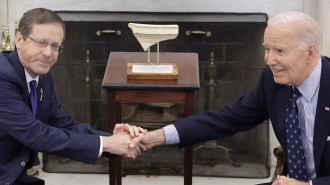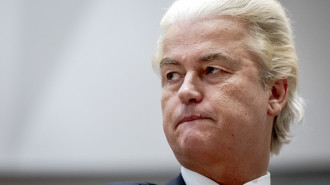Follow us on Facebook, Twitter and Instagram to stay connected
Jewish worshippers told not to kiss Jerusalem's Western Wall over coronavirus concerns
Jewish worshippers told not to kiss Jerusalem's Western Wall over coronavirus concerns
Kissing the wall is not a religious requirement but some Jewish worshippers do so anyway.
2 min read
The Rabbi is urging Jewish worshippers not to kiss the wall [Getty]
Jewish worshippers are being told not to kiss the stones on the Buraq Wall - or, as Jewish people refer to it, the Western Wall - in an attempt to prevent the spread of the coronavirus.
"Do not kiss the Western Wall stones," the site's rabbi, Shmuel Rabinowitz told worshippers. Rabinowitz added that they should maintain "proper distance" between one another and "abide by required hygiene practices".
This comes as the coronavirus hit Israel and Palestine, with the chief rabbi of the Jerusalem religious site adding to other measures taken by religious authorities to curb the spread of COVID-19.
Jews visit the Western Wall to pray and put written prayers in between the stones. Though kissing the stones is not religious doctrine, many religious Jews do so to show the depth of their belief and respect for God.
Israel slaps coronavirus order on West Bank
Israel closed off Palestinian-administered areas of the occupied West Bank on Wednesday to limit the spread of the coronavirus, an official said.
 |
"From today, a closure has taken place in the West Bank," said Yotam Shefer, who heads the international department of COGAT, the Israeli military body responsible for civilian affairs in the Palestinian territories.
He informed journalists that the decision had been taken with the Ramallah-based Palestinian administration, who on Sunday had announced the closure of the Al-Aqsa Mosque in Jerusalem.
With 427 Israelis and 44 Palestinians infected, Israel is implementing tough measures to curb the spread.
Though no deaths have been registered, concerns are high and has resulted in Prime Minister Benjamin Netanyahu using emergency powers to allow the country's internal security agency to track those suspected or confirmed of being infected through monitoring their mobile phones.
The invasion of privacy has raised serious concerns in the country, with the Association for Civil Rights in Israel describing it as a ''dangerous precedent''.
Nitza Horowitz, leader of the liberal opposition party Meretz, called the tracking of citizens as amounting to ''a severe violation… of basic civil liberties''.







 Follow the Middle East's top stories in English at The New Arab on Google News
Follow the Middle East's top stories in English at The New Arab on Google News


